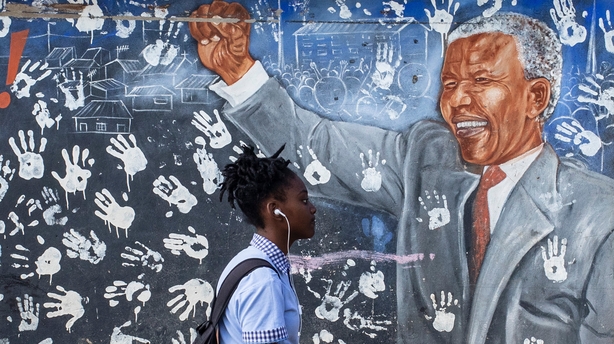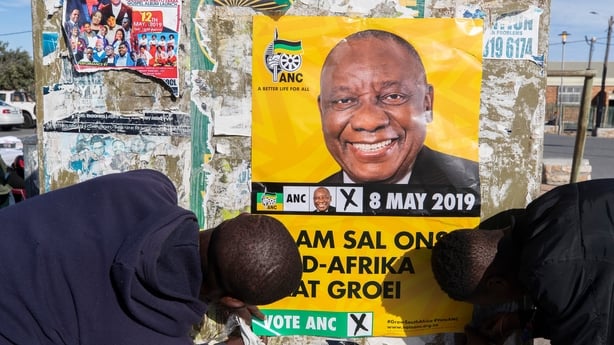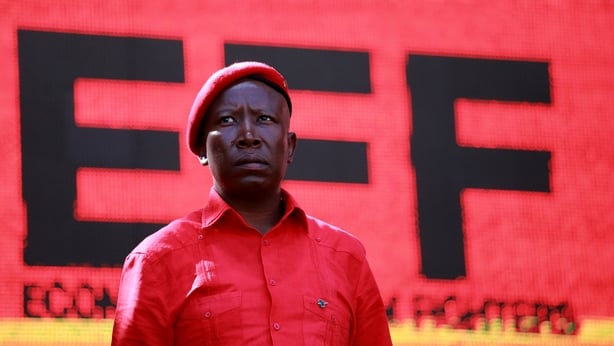South Africans voted today in national elections which the ruling African National Congress (ANC), in power since 1994, is favourite to win despite anger over corruption scandals, sluggish economic growth and record unemployment.
The election is the first measure of whether President Cyril Ramaphosa can reinvigorate support for a party whose backing rests largely on its liberation credentials, but now faces the prospect of a reduced majority.
The 66-year-old took over last year after the ANC forced then-president Jacob Zuma to resign after a nine-year term dominated by corruption allegations and a struggling economy.
Mr Zuma oversaw the party's most significant drop in support in the democratic era.
"This is a vote that reminds us of 1994 ... heralding a new period," Mr Ramaphosa said after casting his ballot at a school in Soweto, and described himself as "excitedly confident" of the outcome.
"I am truly humbled by the turnout ... it's a vote for the democratic system we have been building for 25 years," he said. "This is like a rocket booster for democracy."
The 1994 vote saw Nelson Mandela and the ANC take power in the country's first multi-racial polls, marking the end of apartheid.

Support for the ANC has fallen in every election since 2004 with the party taking 54% in 2016 municipal elections, compared with 62% in 2014's national vote.
Most opinion surveys suggest the ANC will secure nearly 60% of today's vote, thanks to Mr Ramaphosa's appeal and a fractured opposition.
Read More:
The sun hasn't set on the ANC in South Africa
'Let us share the land'
Land ownership debate brings uncertainty to SA farmers
The ANC has been confronted by deepening public anger over its failure to tackle poverty and inequality in post-apartheid South Africa.
The economy grew just 0.8% in 2018 and unemployment hovers at a high of nearly 27%, rising to over 50% among young people.
Corruption, especially in state-owned companies, became almost endemic under Mr Zuma.

Of the 47 opposition parties in the race, only the main opposition centrist Democratic Alliance (DA) and the radical-left Economic Freedom Fighters (EFF) are major players.
The DA hopes to shed its image as a white, middle-class party.
Its first black leader, Mmusi Maimane, is contesting his first general election since taking the helm in 2015, and is expected to make modest gains on the DA's 2014 vote share of 22%.
"Vote for the future of this country and the South Africans who are unemployed," Mr Maimane said after casting his ballot in Soweto, insisting the poll was not "a beauty pageant but a contract" between voters and their representatives.
But the EFF, founded just six years ago by former ANC youth leader Julius Malema, is predicted to make major gains, growing from 6.3% to a forecast 11%.

"A lot of people died for us to vote - we are here to honour their memories," said Mr Malema as he voted in eastern Limpopo province. "If you need change, EFF is the way to go," he added.
The party, which appeals mainly to young voters and the poor, has campaigned on a policy of seizing land from white owners to give to blacks. Enforced land redistribution is also ANC policy, alarming some investors.
About 26.8 million voters are registered to cast ballots at 22,925 polling stations.
Polls opened at 7am (6am Irish time) and closed 14 hours later.
Preliminary results will emerge tomorrow with an official winner set to be declared on Saturday.
The party that wins most seats in parliament selects the president, who will be sworn in on 25 May.

